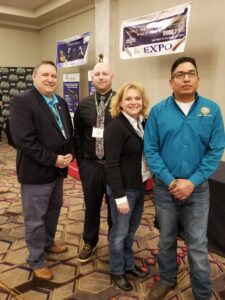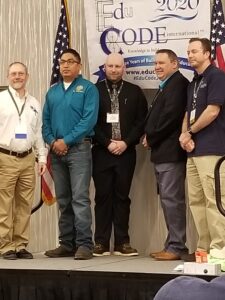
Veterans gain valuable experience at 2020 EduCode conference

![]() Thanks to the generosity of International Code Council regional chapters, two U.S. military veterans were able to attend this year’s EduCode conference in Las Vegas with all expenses paid — enabling them to gain valuable knowledge, experience and relationships and put them to use in their local communities where building safety makes a difference every day.
Thanks to the generosity of International Code Council regional chapters, two U.S. military veterans were able to attend this year’s EduCode conference in Las Vegas with all expenses paid — enabling them to gain valuable knowledge, experience and relationships and put them to use in their local communities where building safety makes a difference every day.
U.S. Marine Corps veteran David Jackson, an inspector in the Building Safety Division of the Gila River Indian Community in Arizona, was nominated by the Code Council Government Relations department to attend this year’s conference. The Code Council’s Region II chapter nominated U.S. Army veteran Christopher Corlies, who is a student in the Building Inspection Technology Associates program at Chemeketa Community College in Salem, Ore.
Since 1997, the annual week-long EduCode conference has been a gathering place for thousands of code professionals who look forward to a packed agenda of classes and sessions on the latest developments and trends in building codes. Attendees take advantage of the opportunity to seek out professional development opportunities and grow their professional peer networks. The conference is organized by the Southern Nevada Chapter of the International Code Council in conjunction with the chapter’s partners and with the help of volunteers from throughout Southern Nevada.
This year’s conference featured 16 parallel programming tracks, covering everything from the latest changes to the International Codes (I-Codes) to how-to sessions on building inspection techniques, sprinkler system installation and plan review; the fundamentals of architectural design; and the legal aspects of code administration. The conference also included a three-day Commercial Building Inspector Test Academy. The Code Council conveys Preferred Provider certification on all EduCode sessions, which are recognized for continuing education units (CEUs) towards the maintenance of ICC certifications.
The effort to sponsor attendance by military veterans who are new to the building safety profession was spearheaded three years ago by Elizabeth Rider, a building plans examiner in Prescott Valley, Ariz., who also serves as secretary for ICC Region I. A U.S. Air Force veteran, Rider said EduCode provides an unparalleled opportunity to learn a comprehensive range of valuable information in a single setting. “EduCode is the one environment in the country where all employee skill levels are recognized and education is available for all,” Rider said. “Every year, EduCode not only puts on fantastic educational opportunities but also has social events to entertain the participants at which attendees have a better opportunity to interact with one another and form friendships and professional relationships which carry on after the conference.”
Rider said that the veteran sponsorship program is already paying dividends. “So far, our program has been able to sponsor five individuals, two of whom now have permanent jobs in their jurisdictions and one of whom is going to a community college and working toward his degree,” Rider explained.
Rider said that many people and organizations have been involved in the success of the program, including EduCode’s organizers and ICC Region II. Rider added that Region II even raised money for the program through t-shirt sales at the Code Council’s 2019 Annual Business Meeting in Las Vegas.
Impressed by his desire to promote the adoption of the I-Codes among the Native American tribal governments across the U.S. — and his presentation on the subject at the Code Council’s Annual Business Meeting — Jackson was nominated by Code Council Government Relations staff to attend this year’s conference. “When it came time to nominate a veteran to attend this year’s EduCode, we immediately thought of David and knew he would be able to use it as a springboard to working with the Code Council and others in reaching out to the various tribal governments across the nation,” stated Government Relations staff representing Arizona.
Jackson, who retired as a sergeant after serving as an armorer and amphibious assault crewman in the U.S. Marine Corps, said that after a period of searching for work following his discharge, he was able to find a construction trades position with the help of the Gila River Indian Community’s employment and training bureau, which placed him with the Tribal Projects Development Department as a project manager assistant. Soon, Jackson became a building inspector apprentice in the building safety office. It was a complete surprise to be nominated to attend EduCode. “It was an honor,” Jackson said. “I did not know it was coming, and when I got the email notification, it was really humbling.”
Jackson said that attending EduCode was a great experience. “For one, I got to meet members of the ICC Board of Directors and have a good conversation about codes in Indian country, which is something I’m passionate about,” Jackson said.
“We call ourselves the Akimel O’otham, which means ‘The River People,'” Jackson explained. “All the residents are enrolled members of the tribe, and that gives us the ability to understand our cultural history within our land and how to apply these technical documents in a manner that best reflects our culture and values. My interest is learning what other tribal Indian communities are doing for their building codes, so that we can share our knowledge and, as First Nations, work to ensure that we have safe and sustainable buildings within our boundaries.”
Region II President Jack Applegate, who estimates that he is currently mentoring around a dozen early career professionals, said he nominated Corlies to attend EduCode because of his dedication to his newly chosen profession, and his personal character. “Chris is a great example of a veteran training in one of the top community college programs in the country for code officials,” Applegate said. “He is well-deserving of the help.”

EduCode presents a unique opportunity for veterans who are new to the profession to receive training directly from top code officials, network, and have personal time with the ICC Board of Directors, Applegate said, but young professionals at the outset of their careers are often not able to afford to attend. Sponsoring veterans to attend, he said, is one way he can help pay it forward. “When I see the spark in their eyes and know that they are both interested and motivated, I get excited for the potential life-changing opportunity for the next generation of code officials,” Applegate said.
Corlies, who served as a combat medic specialist and later as an armorer while in the U.S. Army, has been working as a security guard and emergency medical technician since his discharge, but said he wanted to broaden his career horizons. “I met with a veterans affairs career counselor twice, a real nice gentleman, and he asked me if I’d ever thought about a career as a building inspector, working in building safety,” Corlies recalled. “I didn’t know anything about the job, so he got me in contact with Jack Applegate. Jack was gracious enough to put me in contact with the Deschutes County building official Randy Scheid. I ended up doing a ride-along with one of his guys and I realized that a lot of what they’re doing is a lot like what I currently do — gaining voluntary compliance. Like a building inspector, sometimes I have to tell a person something that don’t want to hear, but if you can deliver in a way that is respectful, that creates a win-win for everybody.”
Corlies described EduCode as a fantastic experience, and said he focused on the basic residential classes as a way to complement his community college studies. “It just gave me so much more insight into how I’m going to apply everything from fire safety to residential plan review,” he said. “I learned a lot about energy efficiency, which I didn’t really know much about before attending. I got to meet a lot of great people, including the ICC board members, which was really cool. It was a great experience.”
The opportunity to talk to experts in the field about career opportunities was also invaluable, Corlies said. “I did get to meet a lot of people there, and it gave me a better idea of where I can go,” Corlies said. “It gave me a lot more appreciation for the job after talking to different inspectors about what they are going through. One inspector I talked with told me that it’s not just about certifications, it’s also about attitude. He gave me some good insight into what it’s going to take to not only get hired on as a building inspector but also how to be successful at it.”
The effort to encourage veterans to consider careers in building safety is a key component of the Code Council’s Safety 2.0 initiative. Rider, the Air Force veteran who helped establish the EduCode sponsorship program, agrees that military veterans are the perfect candidates for building inspector positions. “They are coming out of the service with special training in attention to details,” Rider explained. “These men and women are strong employees and leaders who are looking for their next career. The ICC and building departments across the country are looking for fine people just like these veterans to come in and take over departments where the current building official is looking to retire and hand over the reins to the next generation.”
The ICC Military Families Career Path Program helps veterans who are transitioning to civilian life and their family members learn more about building safety career options.







